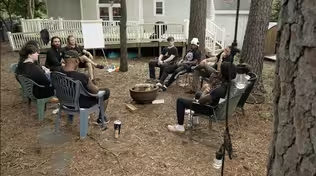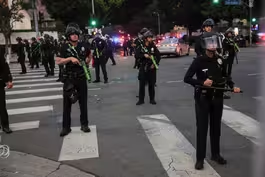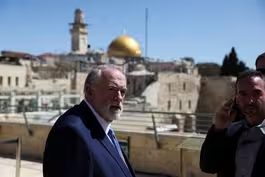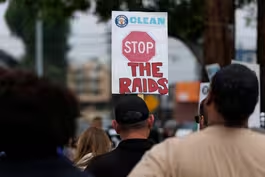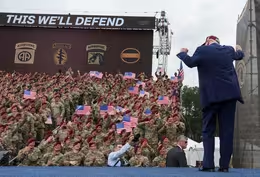
LA mayor on military and National Guard presence
Clip: 6/11/2025 | 7m 1sVideo has Closed Captions
LA mayor says military, National Guard presence 'provoke the population'
The city of Los Angeles has been the center of protests against federal immigration raids. Mayor Karen Bass and more than two dozen other California mayors have asked President Trump to end the sweeps. Bass joined Geoff Bennett to discuss the latest.
Problems playing video? | Closed Captioning Feedback
Problems playing video? | Closed Captioning Feedback
Major corporate funding for the PBS News Hour is provided by BDO, BNSF, Consumer Cellular, American Cruise Lines, and Raymond James. Funding for the PBS NewsHour Weekend is provided by...

LA mayor on military and National Guard presence
Clip: 6/11/2025 | 7m 1sVideo has Closed Captions
The city of Los Angeles has been the center of protests against federal immigration raids. Mayor Karen Bass and more than two dozen other California mayors have asked President Trump to end the sweeps. Bass joined Geoff Bennett to discuss the latest.
Problems playing video? | Closed Captioning Feedback
How to Watch PBS News Hour
PBS News Hour is available to stream on pbs.org and the free PBS App, available on iPhone, Apple TV, Android TV, Android smartphones, Amazon Fire TV, Amazon Fire Tablet, Roku, Samsung Smart TV, and Vizio.
Providing Support for PBS.org
Learn Moreabout PBS online sponsorshipAMNA NAWAZ: Well, downtown Los Angeles has been the center of protest against federal immigration raids.
GEOFF BENNETT: I spoke with its mayor, Karen Bass, a short time ago.
Mayor Karen Bass, thank you for being with us.
Welcome back to the "News Hour."
What is the current situation the ground right now?
You imposed a curfew in downtown Los Angeles.
Has it helped de-escalate the violence, prevent the types of looting we saw earlier this week?
KAREN BASS (D), Mayor of Los Angeles, California: Well, absolutely, it did.
Last night was the first night of the curfew.
And I will tell you, over 100 people were arrested, but they were arrested for failure to disperse and violating curfew, no violence, no vandalism.
And so that is different than the night before.
But when you ask what is going on in general, the city is quiet now.
There are raids that are taking place today.
GEOFF BENNETT: Well, you and dozens of other regional mayors have called for an end to the federal immigration enforcement raids and the deployment of federalized troops.
I want to ask about both of those matters.
But on the immigration raids, I mean, generally speaking, how has it affected immigrant families, the business community, the broader fabric of Los Angeles?
KAREN BASS: Well, and the broader fabric of Los Angeles is absolutely critical, because there are sectors of our economy that are absolutely dependent on immigrant labor.
And so I worry about the construction industry, the hospitality industry.
There is a lot of overall economic impact to our area, but also most important to me are the impact on families, because when your husband goes to work in the morning and gives you a call and says, hey, I think I'm being detained, and you don't know if you're going to see him again, you don't know where he's being taken, is he still in the United States, has he been sent overseas?
Are the people -- do they have any access to their family?
Do they have any access to legal counsel?
And it's my understanding that none of that is taking place.
So it leaves the city with a blanket of fear, a blanket of mistrust and anxiety.
GEOFF BENNETT: The White House Press Secretary Karoline Leavitt, as you well know by now, said today that your opposition to President Trump and his immigration approach, in her words, "has forced you to side with illegal alien criminals and violent rioters over law enforcement officers who are just doing their jobs."
I have no doubt you take issue with that.
But President Trump was elected on this pledge to enforce strict immigration laws.
So what would a just, responsible immigration enforcement approach look like, in your view, especially in a city like Los Angeles, which is a city of immigrants?
KAREN BASS: Yes.
And let me just say that, if I had supported the violence, I would have not called for a curfew.
I would have not asked the Los Angeles Police Department, the California Highway Patrol, and other law enforcement agencies to actively, aggressively participate.
Well, I think, when the president first came in, I think we were all led to believe that the focus was going to be on criminals, drug dealers, violent people.
And it's -- I'm hard-pressed to see that when you are chasing people through Home Depot parking lots, when you're sweeping up street vendors who are selling food, when you're going to a car wash and arresting the people that work there, or the customers.
Those are all things that happen.
The other thing that is happening is people who are here legally with papers, they go for their annual immigration visit to check in, as they are instructed to do, and they do that, and they are being detained.
GEOFF BENNETT: With President Trump federalizing and deploying the National Guard and U.S. Marines over the objections of state and local leaders, what at this point is the level of communication and coordination aimed at managing their presence alongside local law enforcement?
KAREN BASS: Well, now, I haven't spoken to the governor today, but when I last spoke with him, which was yesterday, there was no coordination and there was no communication.
So the federalization of the National Guard was completely unwarranted.
We are used to making that request of our governor, and we have a great relationship, and he always assists when it is appropriate.
No one asked for that help.
You were talking about minor protests, but every time you do something like this, you provoke the population even further.
They are angry because of the raids, they are angry because of the National Guard being here, and now they are really going to be angry if the troops come in.
But even more important than that, what are they going to do?
There is no reason for them to be here.
Right now, the National Guard is protecting one building.
That's it.
They are not involved in crowd control or anything like that.
GEOFF BENNETT: You have said that you see Los Angeles right now as a national experiment in how far the federal government can go in asserting control over cities and states.
What do you believe is the Trump administration's end goal?
And what should other mayors, other cities take from what you have learned in this experience over the past week?
KAREN BASS: Well, I think we are all going to have to look at legal remedies, but I think that we are fortunate in Los Angeles to have a highly organized, well-established immigrant rights sector of our nonprofit community.
And so they are ready when things like this happen.
They have a rapid response network.
They know when the tensions are happening.
They have a bank of a bench of lawyers that can be in contact with people who are detained, if they are allowed.
That is their due process.
That had been the behavior in prior administrations, but this time they are not being allowed.
GEOFF BENNETT: Final question.
When President Trump calls the city of Los Angeles a trash heap, as he did yesterday, when his top aide Stephen Miller accuses you of siding with what he called an insurrectionist mob, to what degree does that complicate your ability to govern effectively and maintain the public confidence?
KAREN BASS: Well, it doesn't really hamper my ability, but all it does is increase the anger in the city.
It increases the anger.
Now, I was there January 6.
I saw an insurrection.
What is going on here is not an insurrection.
And, by the way, it's most important that I tell you that Los Angeles is 500 square miles.
The area where the protests and sometimes devolving into violence is probably about half-a-square mile.
It's about five blocks in the downtown area.
Now, the curfew that I called for covers six square miles, so it's a lot bigger than the protest area.
But when you look at the pictures, especially national news, you think this is happening all over the city.
Most Angelenos have no idea unless they're watching the news.
You could go a few blocks away from where the protests has happened and you won't know that there's anything happening in our city at all.
GEOFF BENNETT: Los Angeles Mayor Karen Bass, you have a lot of demands on your time.
We appreciate you spending some time with us this evening.
Thank you.
KAREN BASS: Thank you.
I appreciate it.
Community groups work to build trust to bridge divides
Video has Closed Captions
Clip: 6/11/2025 | 8m 57s | A look inside community groups working to build trust to bridge divides (8m 57s)
How GOP lawmakers are reacting to immigration raid protests
Video has Closed Captions
Clip: 6/11/2025 | 4m 10s | How GOP lawmakers are reacting to immigration raid protests and Trump's response (4m 10s)
Huckabee on Israel-Hamas war, humanitarian situation in Gaza
Video has Closed Captions
Clip: 6/11/2025 | 9m 37s | Mike Huckabee on the Israel-Hamas war and humanitarian situation in Gaza (9m 37s)
Immigration raid protests spread to more cities
Video has Closed Captions
Clip: 6/11/2025 | 7m 33s | Immigration raid protests spread to more cities as Trump threatens additional deployments (7m 33s)
Trump blurs line between military and partisan politics
Video has Closed Captions
Clip: 6/11/2025 | 6m 27s | Trump's remarks at Fort Bragg blur line between military and partisan politics (6m 27s)
Providing Support for PBS.org
Learn Moreabout PBS online sponsorship
- News and Public Affairs

FRONTLINE is investigative journalism that questions, explains and changes our world.

- News and Public Affairs

Amanpour and Company features conversations with leaders and decision makers.












Support for PBS provided by:
Major corporate funding for the PBS News Hour is provided by BDO, BNSF, Consumer Cellular, American Cruise Lines, and Raymond James. Funding for the PBS NewsHour Weekend is provided by...
